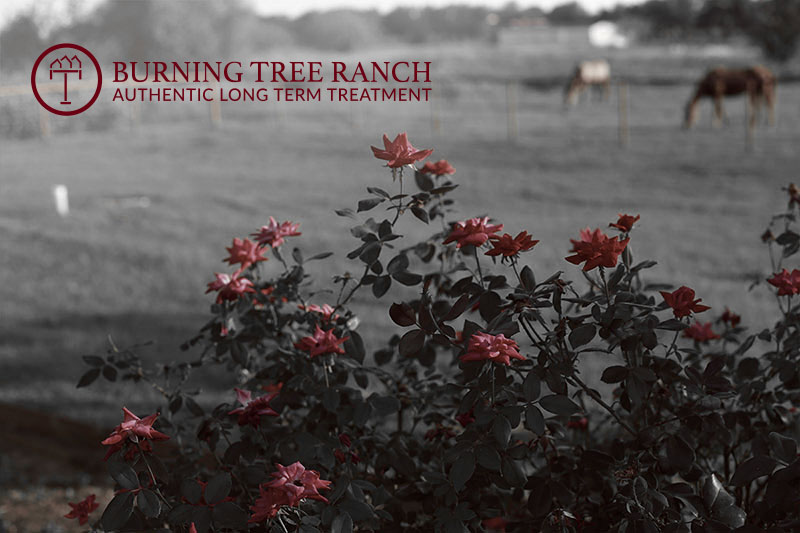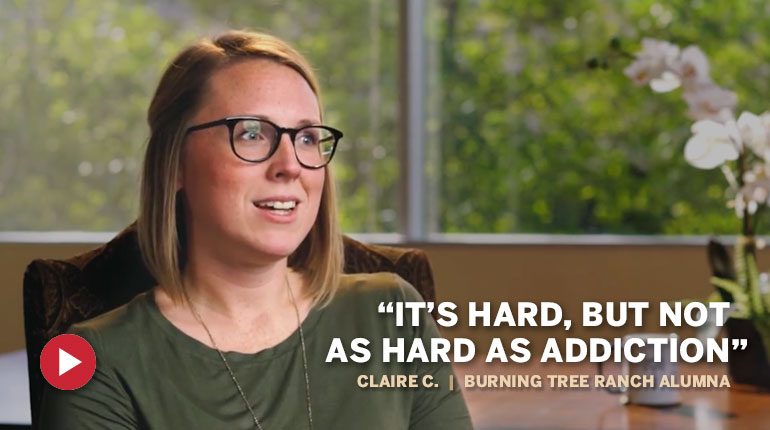Therapies
12-Step Immersion in Long-Term Addiction Treatment: Following the Path to Lifelong Recovery
As a long-term, progress-based facility, Burning Tree Ranch offers more therapeutic exposure than any program in the nation. Our clinical approach, philosophies, and mission are firmly grounded in the fundamental belief that permanent, lifelong sobriety is attainable for chronic relapsers.
Part of our clinical approach is to invite our clients to have a brand-new experience with the Twelve Steps and develop a deeper experience of the healing necessary to make full, permanent recoveries.
"We were having trouble with personal relationships, we couldn't control our emotional natures, we were prey to misery and depression, we couldn't make a living, we had a feeling of uselessness, we were full of fear, we were unhappy."
~ Alcoholics Anonymous, p. 52
Working the 12 Steps at Burning Tree Ranch
Burning Tree Ranch is a specialty program dedicated to the treatment of chronic addiction and mental health. Our program is long-term, progress-based, and highly intensive.
The twelve-step model, originally developed by Alcoholics Anonymous (AA), is a spiritual program of recovery that has helped countless individuals overcome addiction and transform their lives. Through the practice of the steps, individuals undergo a process of self-reflection, amends-making, and service to others, fostering a deep sense of purpose and connection.
We use the twelve steps to teach our clients how to live by a set of spiritual principles (such as honesty and humility) taught in the Big Book of Alcoholics Anonymous. These principles help our clients move from a self-centered to a more altruistic and selfless place.

The Benefits of 12-Step Immersion in Long-Term Treatment
Operating outside the limitations of a traditional 30-, 60-, or 90-day format, our authentic long-term treatment program adheres to progress-based metrics that inform the clinical treatment team of the individual’s unique mental, emotional, and spiritual needs.
This gives our clients the time and space they need to build a robust support network and acquire the necessary tools to navigate the challenges of recovery with grace and resilience.

“We are often asked by families, ‘with all the addiction medicine and evidence-based therapies that you offer, why the twelve steps?’
The answer is simple: to help them recover.”
Brook McKenzie, LCDC, CEO
Why Didn't the Twelve Steps Work the First Time?
Many chronic relapsers insist they have already tried the twelve steps, and they didn’t work.
At Burning Tree Ranch, we understand this issue well. We help clients address these barriers and develop a deeper, more authentic connection to the 12-step program. We also understand what it really looks like to work through all twelve steps.

What Does Working the 12 Steps Look like?
The twelve steps create a clear-cut design for living and a recipe that, if followed, unifies the chronic relapser with a permanently sober lifestyle. There are several guideposts to help you identify whether or not your loved one is effectively working all twelve steps:

Did they make sincere and frank amends for the harm they have caused you and others, seek to make each of them right, and then follow through?

Did they dedicate a significant portion of their lives to the service of others, helping other addicted persons find the same freedom they had been given?

Did they accept and own responsibility for past mistakes, identify a clear path to no longer engaging in the same behaviors, and then follow through?

Did they attend meetings regularly, embrace service and volunteer commitments, and place spiritual principles (such as honesty & humility) at the forefront of all their affairs?

Did they often speak of gratitude, thanks, and appreciation for their sobriety and the opportunity to serve others in need?

Did they become responsible, accountable, and dependable in their daily life, with consistency and determination?

Did they undergo a psychic change in personality that made them nearly unrecognizable from the addicted person you knew before?
If you are doubtful, you’re not alone. We’ve found that most families will gladly invite their loved ones to engage in a practice of living that promotes humility, integrity, and principle.

“At the end of the day, what we’re really doing is empowering our clients to create a life of excellence.”
Jesse Earwood, Executive Director
Continuing 12-Step Involvement After Treatment Through Tailored Aftercare
Ongoing involvement in the 12-step fellowship is crucial for maintaining long-term recovery after completing a treatment program. Unlike other aftercare programs, we integrate our entire staff and the whole family into the transition process that our clients undergo.
From day one to graduation, we emphasize a teamwork approach that supports chronic relapsers in creating a life of purpose through continued commitment to the 12 steps.

Rediscover the 12 Steps in Authentic Long-Term Treatment
During our long-term treatment program, we help our clients overcome their resistance to a new way of living that requires a profound and sometimes humbling degree of honesty.
We do this compassionately but directly, in a manner that is commensurate with the gravity of the chronic relapser’s life-threatening condition. We believe that abstinence alone will never be enough.
Burning Tree Ranch has held this vision for chronic relapsers since 1999: to share a life of purpose, to be reunited with family, to adopt new disciplines and principles, and to live a life of excellence beyond sobriety.

